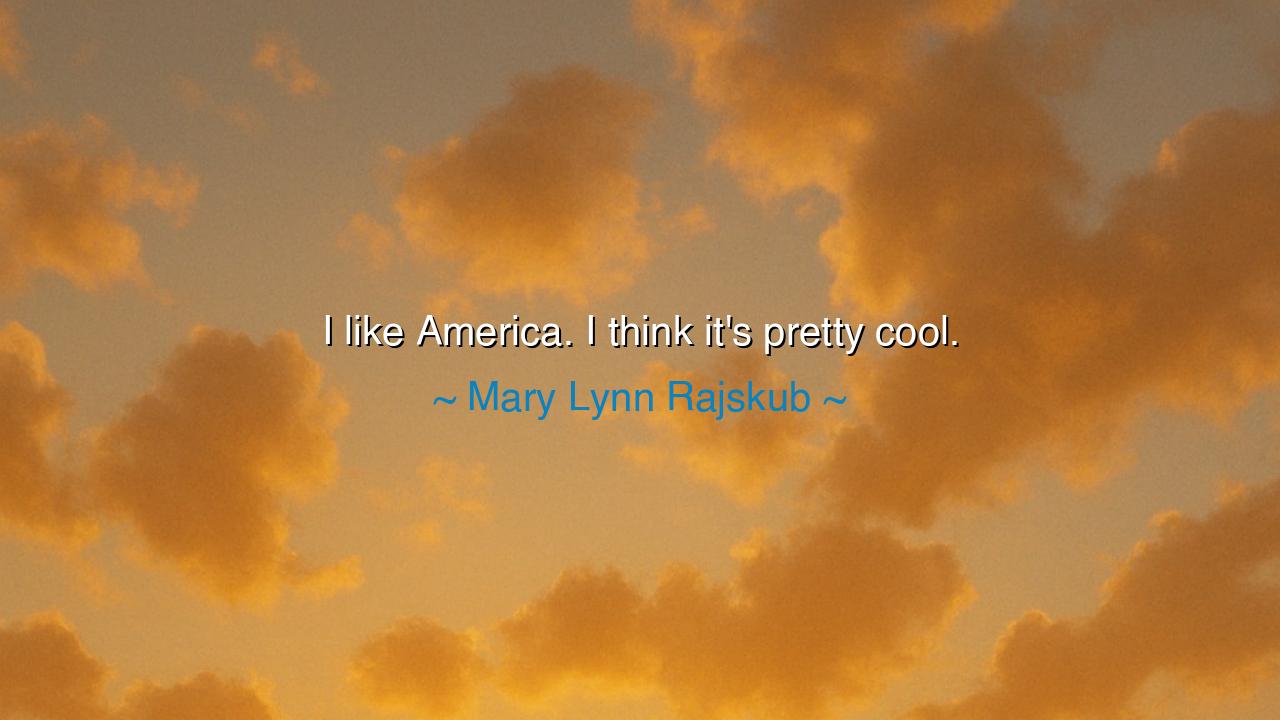
I like America. I think it's pretty cool.






In the vast and ever-changing tapestry of human experience, there are moments when the simplest of words can carry profound meaning. The words of Mary Lynn Rajskub, “I like America. I think it’s pretty cool,” may seem at first glance like a casual, even playful, remark, but in truth, they are a reflection of something far deeper—the universal human longing to find beauty and purpose in the world around us. To say, “I like America,” is not simply to express a preference for a place; it is to acknowledge the complexity and diversity of a nation, its many contradictions, and the potential it holds for those who are willing to look beyond the surface.
This simple statement mirrors the feelings of countless individuals who, throughout history, have been drawn to the promise of a place—a land of opportunity, where the potential for greatness lies not in one’s birthright, but in one’s ability to dream and to pursue those dreams. To "like" America, in this sense, is to acknowledge the freedom that the country offers, a freedom that has inspired many to rise from humble beginnings to achieve greatness. The ancient Greek philosophers often spoke of the importance of freedom in shaping the human spirit. Socrates believed that only through the pursuit of knowledge and the exercise of free will could an individual truly live a virtuous life. So too, America, with all its faults and imperfections, remains a land where the spirit of freedom continues to thrive, where individuals can carve their own paths and make their own choices.
Consider the story of George Washington, the first president of the United States—a man who, born into modest means, rose to lead a nation through its struggle for independence. Washington's journey was one shaped by his love for his country, and his belief in the ideals upon which it was founded: freedom, equality, and self-determination. To Washington, America was more than just a place—it was a symbol of the potential for human beings to come together and create something greater than themselves. It is in the legacy of Washington and others like him that the simple sentiment expressed by Rajskub—“I think it’s pretty cool”—finds its deepest roots. It is an acknowledgment of a nation’s enduring spirit.
Yet, Rajskub’s statement also calls us to recognize that liking a place—any place—is never without its complexities. America, like all nations, is built upon a foundation of contradictions. It is a country that stands for liberty but also grapples with the history of inequality. It is a land that espouses the ideals of democracy, but at times struggles with division and polarization. Rajskub’s simple statement acknowledges the beauty of America while also, perhaps, subtly nodding to its imperfections. Just as Plato taught that the search for the ideal is a noble pursuit but must always be tempered by the reality of the world around us, so too does America embody both the ideal and the imperfect in its constant quest for progress.
In the same way, we can look to the Roman Empire, a civilization that once ruled the known world and whose ideas of governance, law, and citizenship have shaped modern societies. Yet, despite its power, the Roman Empire was not without its own internal flaws. The empire was built on the contradictions of imperialism and justice, of civilization and conquest. Yet, Rome’s legacy endures because it represented the potential for great achievements and a vision of what could be, even as it struggled with its own internal turmoil. So too, America—like Rome—represents a vision of potential, even if that potential has often been met with struggle and contradiction.
The lesson here, then, is that we must approach both ourselves and our nations with a sense of recognition and balance. To say, “I like America,” is to embrace the hope and promise that any place or people can hold. It is to acknowledge the beauty and the potential inherent in the pursuit of freedom and self-determination, even if that pursuit is imperfect. In our lives, we too must strive to see the good and bad in the world and ourselves, for it is only through accepting the complexity of life that we can find the wisdom to move forward.
So, let us take Rajskub’s simple statement as a reminder that we must find joy in the present and embrace the hope for a better future, while recognizing the work that still needs to be done. Just as Mary Lynn Rajskub looks at America with affection despite its flaws, we too can look at the world around us and appreciate the potential for growth and improvement, all while recognizing that perfection is never the goal—progress is. In doing so, we find the courage to continue moving forward, embracing both the beauty and the imperfection of the journey.






AAdministratorAdministrator
Welcome, honored guests. Please leave a comment, we will respond soon